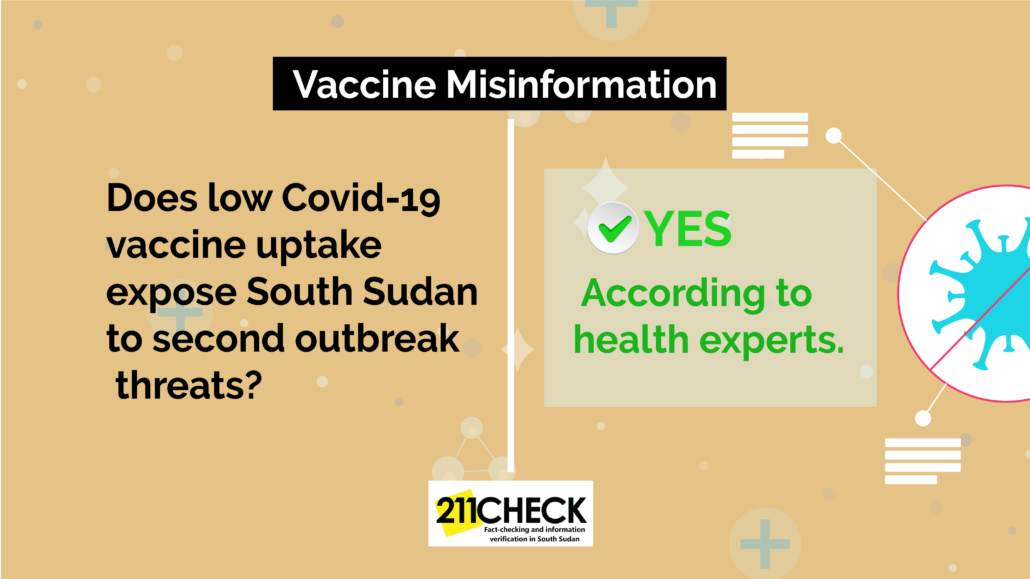COVID-19: Low vaccine uptake coupled with minimal adherence to preventive measures exposes South Sudan to second virus wave
As some countries around the globe fight to contain the outbreak of Covid-19 various waves, South Sudan remains vulnerable to more infections from the expected third wave of the coronavirus pandemic, according to health experts.
Recently, the Ministry of Health confirmed the presence of the Delta Covid-19 variant in South Sudan.
As part of the campaign to minimise the virus spread, the ministry says it has so far administered 56, 587 doses of the AstraZeneca vaccine from both the first and second consignments that the country received from the UK based COVAX facility.
The health institution, however, stressed that at least 4 percent of the 60,000 AstraZeneca vaccines that the country received from the Covax Facility in April this year were wasted.
According to the World Health Organization (WHO), South Sudan is expecting to get its third batch of the vaccine in early August – this is after the second AstraZeneca vaccine consignment expired on July 18. The health ministry recently said it has stopped administering the remainder of the expired AstraZeneca vaccines.
In various interviews with 211 Check last week, health experts revealed that there has been low uptake of the vaccine, attributing the occurrence to expiration concerns, logistical challenges and vaccine misinformation.
The tendency, according to health authorities, constitutes a danger to the population especially, since there has been an upsurge in the cases of the Delta variant across the region.
Dr. John Romunu – Director General for Preventive Health Services at the Ministry of Health encourages South Sudanese to participate collectively in the reduction of the virus spread, in order to mitigate the third wave and new variant.
“The vaccines are the safer preventive measure for Covid-19 but the low number of doses South Sudan receives from the world in terms of donation, coupled with the public reluctance of citizens to take the vaccine creates more danger for the population.
“Humbly, we [Ministry] encourage people to continue following all the recommended Covid-19 preventive measures, to avoid more transmissions of the virus,” said Romunu.
Dr. Romunu went on to appeal to members of the public to adhere to all preventive measures.
Threats associated with the Delta Variant
In Mid-July, South Sudan confirmed its first case of the highly contagious Delta Variant.
According to the US Center for Disease Control and Prevention, the Delta is the name for the B.1.617.2 Variant, a SARS-CoV-2 mutation that originally surfaced in India.
The first Delta case was identified in December 2020, and the strain spread rapidly, soon becoming the dominant strain of the virus in India and then Great Britain.
As per health experts, the symptoms are similar to those seen with the original coronavirus strain and other variants, including a persistent cough, headache, fever, and sore throat.
The late July confirmation of two more cases of Delta Variants in South Sudan means the country so far has three cases of the new coronavirus variant.
Dr Joseph Francis Wamala, a senior epidemiologist at the WHO South Sudan office says countries across the world still continue to report an upsurge on Covid-19 related deaths despite massive vaccination actions, which so far have translated to 3.4 billion administered doses globally.
“What is significant for this period is the fact that even after having effective vaccines, we continue to get very high numbers of deaths that continue to be reported among vulnerable groups”.
Dr. Wamala warns that there are no indications for the pandemic coming to an end, as more cases continue to be reported at the global level.
He added that the global shortage of vaccines poses another serious threat to countries in dire need to vaccinate their most vulnerable populations.
The UN health expert stressed that the new worry is the effectiveness of the current vaccine which has been reduced by the new variant.
“Some of the gaps that are really worrying include the global shortage of vaccines. Only a quarter of the global population is being vaccinated and most of the vaccinated are in a few high- and upper-income countries.
“And the reason to worry is that the new variant has actually minimised the effectiveness of the vaccines that we have,” Wamala said.
Dr. Wamala encourages governments to do readiness assessments and ensure that they have enough contingency measures such as adequate oxygen in their health facilities.
As of July 30, South Sudan had recorded 11,049 cumulative cases of Covid-19, with 118 deaths and 10, 099 recoveries.
The good news for South Sudan is that according to the Ministry of Health, the COVAX facility is said to have approved 732, 000 AstraZeneca doses for the world’s youngest nation. This development might propel South Sudan’s efforts in its fight against the Coronavirus.
Author: Woja Emmanuel Wani – AFF Fellow – Cohort 3, edited by Garang Abraham and Eleanor Macheso.
NOTE: This article was produced as a result of partnership between DefyHateNow and Medaan, with support from Article19.
END…




Leave a Reply
Want to join the discussion?Feel free to contribute!